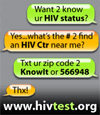National Black HIV/AIDS Awareness Day
Transcript
February 2, 2007
In observance of National Black HIV/AIDS Awareness Day on Feb 7, Dr. Kevin Fenton, Director of CDC’s National Center for HIV, STD, and TB Prevention, provides information on the HIV/AIDS epidemic among African Americans, related risk factors, and the importance of getting educated about and tested for HIV.
Hello. February 7 is National Black HIV/AIDS Awareness Day. It is a day to focus on the prevention of HIV/AIDS in our community. While Blacks make up 13 percent of the population in the United States, we now account for 49 percent of all HIV and AIDS cases in this country. And many more in our community continue to be infected, and affected by this devastating disease. Today, of the more than 1 million Americans estimated to be living with HIV, nearly half of them are African Americans.
In 2005, 74% of African American women living with HIV were infected during sexual contact with a man. And close to a quarter of infections among Black women were associated with injection drug use. Nearly half of African American men living with HIV were infected during sexual contact with a man - that is through sex between men. Twenty-three percent of HIV infections among African American men were associated with injection drug use and another 22% (or 1 in 5 infections) were associated with sexual contact with a woman.
Now, these statistics paint a bleak picture, but it is important to remember that being of black race or black ethnicity does not in itself put you at risk for HIV. However, some African Americans face unique challenges that may place them at an increased risk of contracting HIV, including socioeconomic factors, such as poverty and stigma; high rates of sexually transmitted diseases or STDs; and substance use.
People with limited economic resources often have to deal with a multitude of competing priorities every day. Concern about their health may not be as high on their list of priorities, compared to having other basic needs met. Other factors can affect people’s ability to get information about HIV/AIDS, and access to prevention services and testing. Stigma surrounding HIV/AIDS also can affect health seeking behaviors, such as HIV testing as well as a person’s willingness to disclose if they are infected with HIV to their partners, family members, friends and colleagues.
African Americans also remain a population group disproportionately affected by STDs. In 2005, African Americans were 18 times more likely than whites to be diagnosed with gonorrhea and about 5 and half times more likely to be diagnosed with syphilis. People infected with STDs are at least two to five times more likely to acquire HIV if they are exposed to the virus through sexual contact. Also, someone living with HIV who is co-infected with another STD, is substantially more likely to transmit HIV through sexual contact.
Injecting drugs is the second leading cause of HIV infection among African Americans. Moreover, people who are under the influence of drugs are more likely to take risks, such as unprotected sex.
Limited access to health care is another challenge. While close to half of all those diagnosed with HIV in 2005 were African American, many were not diagnosed until they developed AIDS. Now, the development of AIDS can take up to 10 years after someone first becomes infected with HIV.
So how can we deal more effectively address this crisis within our community? Well, prompt and early diagnosis of HIV is one critical step. This is important since unrecognized HIV infections account for more than half of all new sexually transmitted HIV infections each year. Once diagnosed, those living with HIV can fully benefit from available life-saving treatments. They can also take steps to protect their partners and protect their community.
Make Feb 7, Black HIV/AIDS Awareness Day, the day you get educated about HIV, and a day when you talk to others, your family members, your friends, and your partners about HIV. If you have never had an HIV test, or had your last HIV test some time ago, do consider getting tested again. Knowledge is truly power. It is the power to protect. It is the power to educate. And it is the power to make a difference.
You can learn more about Black HIV/AIDS Awareness Day at www.cdc.gov/hiv . You can also get information on where to get an HIV test at www.hivtest.org.
Now is your time to act.



